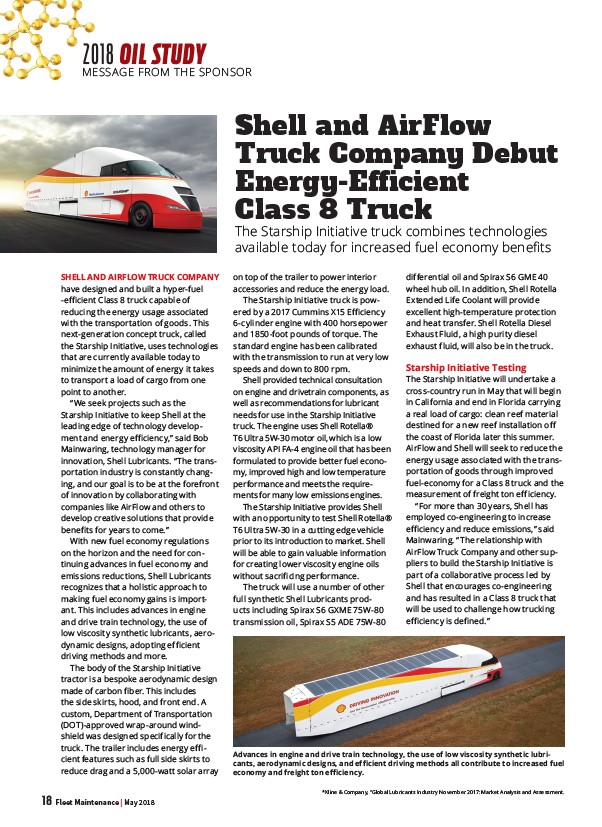
2018 OIL STUDY
MESSAGE FROM THE SPONSOR
18 Fleet Maintenance | May 2018
Shell and AirFlow
Truck Company Debut
Energy-Efficient
Class 8 Truck
The Starship Initiative truck combines technologies
available today for increased fuel economy benefi ts
SHELL AND AIRFLOW TRUCK COMPANY
have designed and built a hyper-fuel
-efficient Class 8 truck capable of
reducing the energy usage associated
with the transportation of goods. This
next-generation concept truck, called
the Starship Initiative, uses technologies
that are currently available today to
minimize the amount of energy it takes
to transport a load of cargo from one
point to another.
“We seek projects such as the
Starship Initiative to keep Shell at the
leading edge of technology development
and energy efficiency,” said Bob
Mainwaring, technology manager for
innovation, Shell Lubricants. “The transportation
industry is constantly changing,
and our goal is to be at the forefront
of innovation by collaborating with
companies like AirFlow and others to
develop creative solutions that provide
benefits for years to come.”
With new fuel economy regulations
on the horizon and the need for continuing
advances in fuel economy and
emissions reductions, Shell Lubricants
recognizes that a holistic approach to
making fuel economy gains is important.
This includes advances in engine
and drive train technology, the use of
low viscosity synthetic lubricants, aerodynamic
designs, adopting efficient
driving methods and more.
The body of the Starship Initiative
tractor is a bespoke aerodynamic design
made of carbon fiber. This includes
the side skirts, hood, and front end. A
custom, Department of Transportation
(DOT)-approved wrap-around windshield
was designed specifically for the
truck. The trailer includes energy efficient
features such as full side skirts to
reduce drag and a 5,000-watt solar array
on top of the trailer to power interior
accessories and reduce the energy load.
The Starship Initiative truck is powered
by a 2017 Cummins X15 Efficiency
6-cylinder engine with 400 horsepower
and 1850-foot pounds of torque. The
standard engine has been calibrated
with the transmission to run at very low
speeds and down to 800 rpm.
Shell provided technical consultation
on engine and drivetrain components, as
well as recommendations for lubricant
needs for use in the Starship Initiative
truck. The engine uses Shell Rotella®
T6 Ultra 5W-30 motor oil, which is a low
viscosity API FA-4 engine oil that has been
formulated to provide better fuel economy,
improved high and low temperature
performance and meets the requirements
for many low emissions engines.
The Starship Initiative provides Shell
with an opportunity to test Shell Rotella®
T6 Ultra 5W-30 in a cutting edge vehicle
prior to its introduction to market. Shell
will be able to gain valuable information
for creating lower viscosity engine oils
without sacrificing performance.
The truck will use a number of other
full synthetic Shell Lubricants products
including Spirax S6 GXME 75W-80
transmission oil, Spirax S5 ADE 75W-80
differential oil and Spirax S6 GME 40
wheel hub oil. In addition, Shell Rotella
Extended Life Coolant will provide
excellent high-temperature protection
and heat transfer. Shell Rotella Diesel
Exhaust Fluid, a high purity diesel
exhaust fluid, will also be in the truck.
Starship Initiative Testing
The Starship Initiative will undertake a
cross-country run in May that will begin
in California and end in Florida carrying
a real load of cargo: clean reef material
destined for a new reef installation off
the coast of Florida later this summer.
AirFlow and Shell will seek to reduce the
energy usage associated with the transportation
of goods through improved
fuel-economy for a Class 8 truck and the
measurement of freight ton efficiency.
“For more than 30 years, Shell has
employed co-engineering to increase
efficiency and reduce emissions,” said
Mainwaring. “The relationship with
AirFlow Truck Company and other suppliers
to build the Starship Initiative is
part of a collaborative process led by
Shell that encourages co-engineering
and has resulted in a Class 8 truck that
will be used to challenge how trucking
efficiency is defined.”
Advances in engine and drive train technology, the use of low viscosity synthetic lubricants,
aerodynamic designs, and efficient driving methods all contribute to increased fuel
economy and freight ton efficiency.
*Kline & Company, “Global Lubricants Industry November 2017: Market Analysis and Assessment.